Civil Law Report: Adoption Rights of Same-Sex Couples in New York
VerifiedAdded on 2023/01/20
|9
|2672
|75
Report
AI Summary
This report provides an overview of the civil law concerning the adoption of children by homosexual couples, primarily focusing on the legal landscape in New York. The report begins with an introduction that highlights the historical context of the law and the Supreme Court's role in shaping adoption rights. It then delves into the current status of the law, summarizing Section 110 of the New York Domestic Relations Law, which governs adoption. The report further examines the main points of the law, state authority, limitations, and state responsibilities. Relevant case law, including Julie Margia v Lori Flint, Senate Bill 87, and Senate Bill 151, is also discussed to illustrate the legal complexities. The report concludes with proposed changes to expand adoption rights for homosexual couples across the United States.

Running Head: CIVIL LAW 1
Civil Law
Civil Law
Paraphrase This Document
Need a fresh take? Get an instant paraphrase of this document with our AI Paraphraser
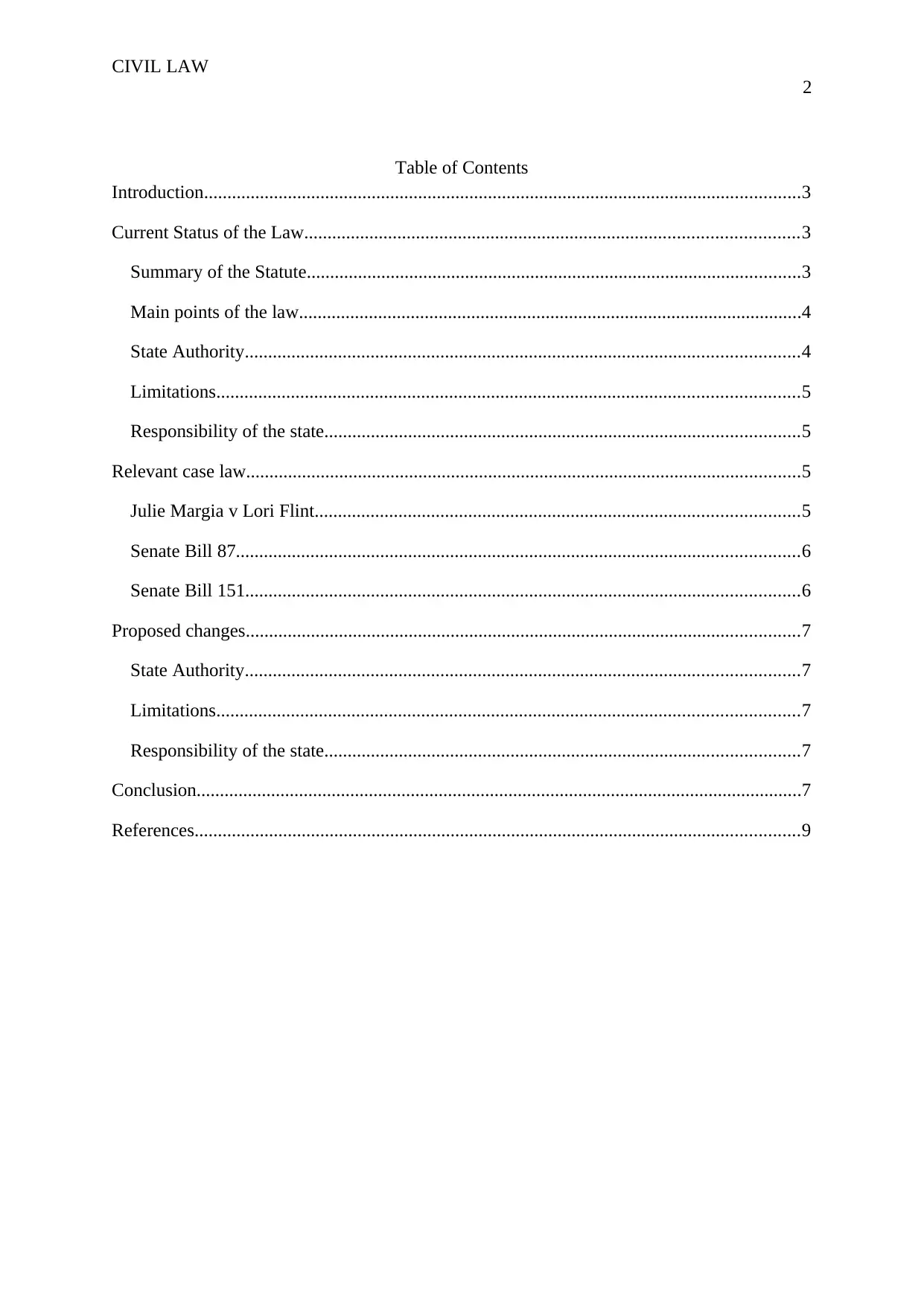
CIVIL LAW
2
Table of Contents
Introduction................................................................................................................................3
Current Status of the Law..........................................................................................................3
Summary of the Statute..........................................................................................................3
Main points of the law............................................................................................................4
State Authority.......................................................................................................................4
Limitations.............................................................................................................................5
Responsibility of the state......................................................................................................5
Relevant case law.......................................................................................................................5
Julie Margia v Lori Flint........................................................................................................5
Senate Bill 87.........................................................................................................................6
Senate Bill 151.......................................................................................................................6
Proposed changes.......................................................................................................................7
State Authority.......................................................................................................................7
Limitations.............................................................................................................................7
Responsibility of the state......................................................................................................7
Conclusion..................................................................................................................................7
References..................................................................................................................................9
2
Table of Contents
Introduction................................................................................................................................3
Current Status of the Law..........................................................................................................3
Summary of the Statute..........................................................................................................3
Main points of the law............................................................................................................4
State Authority.......................................................................................................................4
Limitations.............................................................................................................................5
Responsibility of the state......................................................................................................5
Relevant case law.......................................................................................................................5
Julie Margia v Lori Flint........................................................................................................5
Senate Bill 87.........................................................................................................................6
Senate Bill 151.......................................................................................................................6
Proposed changes.......................................................................................................................7
State Authority.......................................................................................................................7
Limitations.............................................................................................................................7
Responsibility of the state......................................................................................................7
Conclusion..................................................................................................................................7
References..................................................................................................................................9
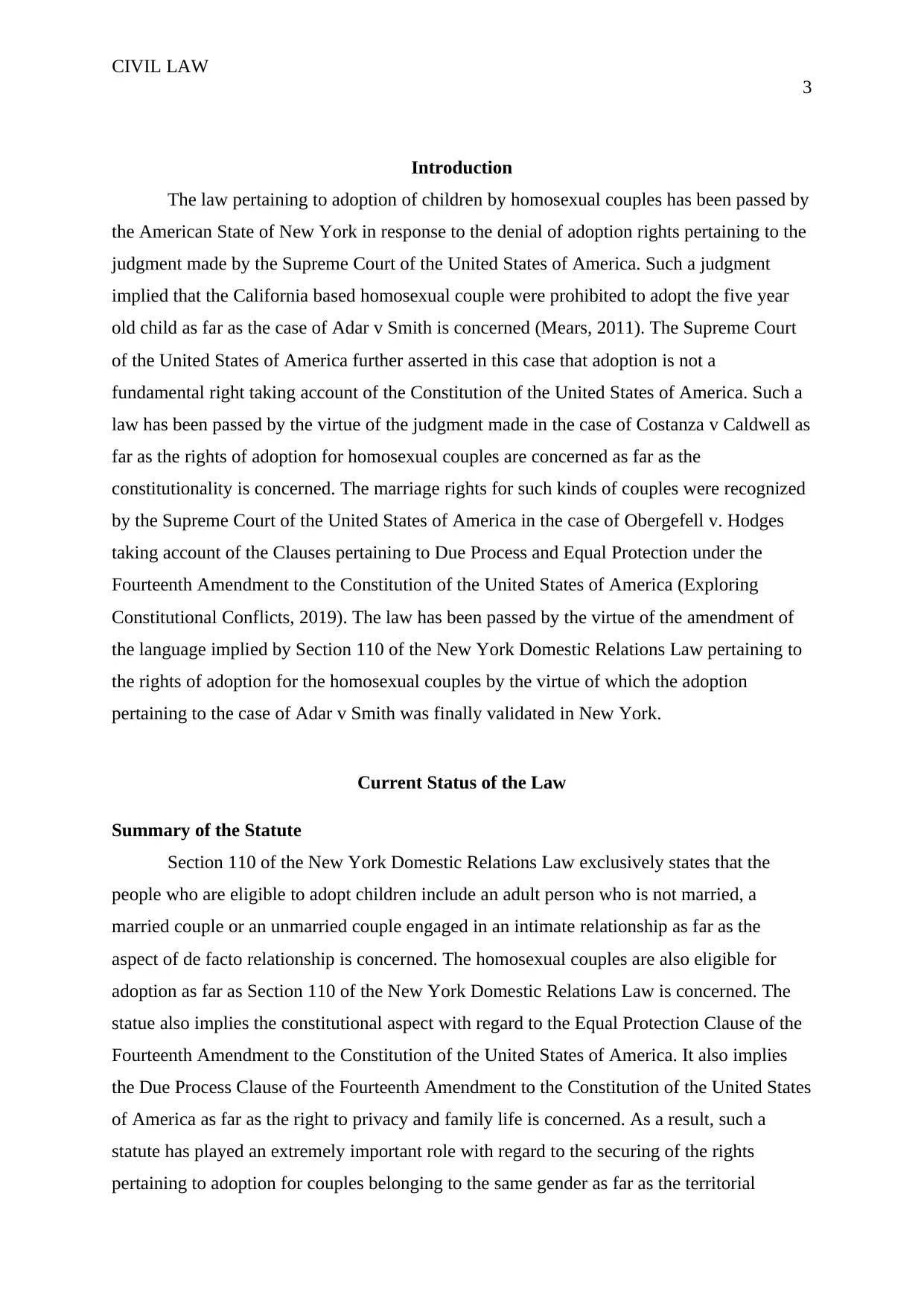
CIVIL LAW
3
Introduction
The law pertaining to adoption of children by homosexual couples has been passed by
the American State of New York in response to the denial of adoption rights pertaining to the
judgment made by the Supreme Court of the United States of America. Such a judgment
implied that the California based homosexual couple were prohibited to adopt the five year
old child as far as the case of Adar v Smith is concerned (Mears, 2011). The Supreme Court
of the United States of America further asserted in this case that adoption is not a
fundamental right taking account of the Constitution of the United States of America. Such a
law has been passed by the virtue of the judgment made in the case of Costanza v Caldwell as
far as the rights of adoption for homosexual couples are concerned as far as the
constitutionality is concerned. The marriage rights for such kinds of couples were recognized
by the Supreme Court of the United States of America in the case of Obergefell v. Hodges
taking account of the Clauses pertaining to Due Process and Equal Protection under the
Fourteenth Amendment to the Constitution of the United States of America (Exploring
Constitutional Conflicts, 2019). The law has been passed by the virtue of the amendment of
the language implied by Section 110 of the New York Domestic Relations Law pertaining to
the rights of adoption for the homosexual couples by the virtue of which the adoption
pertaining to the case of Adar v Smith was finally validated in New York.
Current Status of the Law
Summary of the Statute
Section 110 of the New York Domestic Relations Law exclusively states that the
people who are eligible to adopt children include an adult person who is not married, a
married couple or an unmarried couple engaged in an intimate relationship as far as the
aspect of de facto relationship is concerned. The homosexual couples are also eligible for
adoption as far as Section 110 of the New York Domestic Relations Law is concerned. The
statue also implies the constitutional aspect with regard to the Equal Protection Clause of the
Fourteenth Amendment to the Constitution of the United States of America. It also implies
the Due Process Clause of the Fourteenth Amendment to the Constitution of the United States
of America as far as the right to privacy and family life is concerned. As a result, such a
statute has played an extremely important role with regard to the securing of the rights
pertaining to adoption for couples belonging to the same gender as far as the territorial
3
Introduction
The law pertaining to adoption of children by homosexual couples has been passed by
the American State of New York in response to the denial of adoption rights pertaining to the
judgment made by the Supreme Court of the United States of America. Such a judgment
implied that the California based homosexual couple were prohibited to adopt the five year
old child as far as the case of Adar v Smith is concerned (Mears, 2011). The Supreme Court
of the United States of America further asserted in this case that adoption is not a
fundamental right taking account of the Constitution of the United States of America. Such a
law has been passed by the virtue of the judgment made in the case of Costanza v Caldwell as
far as the rights of adoption for homosexual couples are concerned as far as the
constitutionality is concerned. The marriage rights for such kinds of couples were recognized
by the Supreme Court of the United States of America in the case of Obergefell v. Hodges
taking account of the Clauses pertaining to Due Process and Equal Protection under the
Fourteenth Amendment to the Constitution of the United States of America (Exploring
Constitutional Conflicts, 2019). The law has been passed by the virtue of the amendment of
the language implied by Section 110 of the New York Domestic Relations Law pertaining to
the rights of adoption for the homosexual couples by the virtue of which the adoption
pertaining to the case of Adar v Smith was finally validated in New York.
Current Status of the Law
Summary of the Statute
Section 110 of the New York Domestic Relations Law exclusively states that the
people who are eligible to adopt children include an adult person who is not married, a
married couple or an unmarried couple engaged in an intimate relationship as far as the
aspect of de facto relationship is concerned. The homosexual couples are also eligible for
adoption as far as Section 110 of the New York Domestic Relations Law is concerned. The
statue also implies the constitutional aspect with regard to the Equal Protection Clause of the
Fourteenth Amendment to the Constitution of the United States of America. It also implies
the Due Process Clause of the Fourteenth Amendment to the Constitution of the United States
of America as far as the right to privacy and family life is concerned. As a result, such a
statute has played an extremely important role with regard to the securing of the rights
pertaining to adoption for couples belonging to the same gender as far as the territorial
⊘ This is a preview!⊘
Do you want full access?
Subscribe today to unlock all pages.

Trusted by 1+ million students worldwide
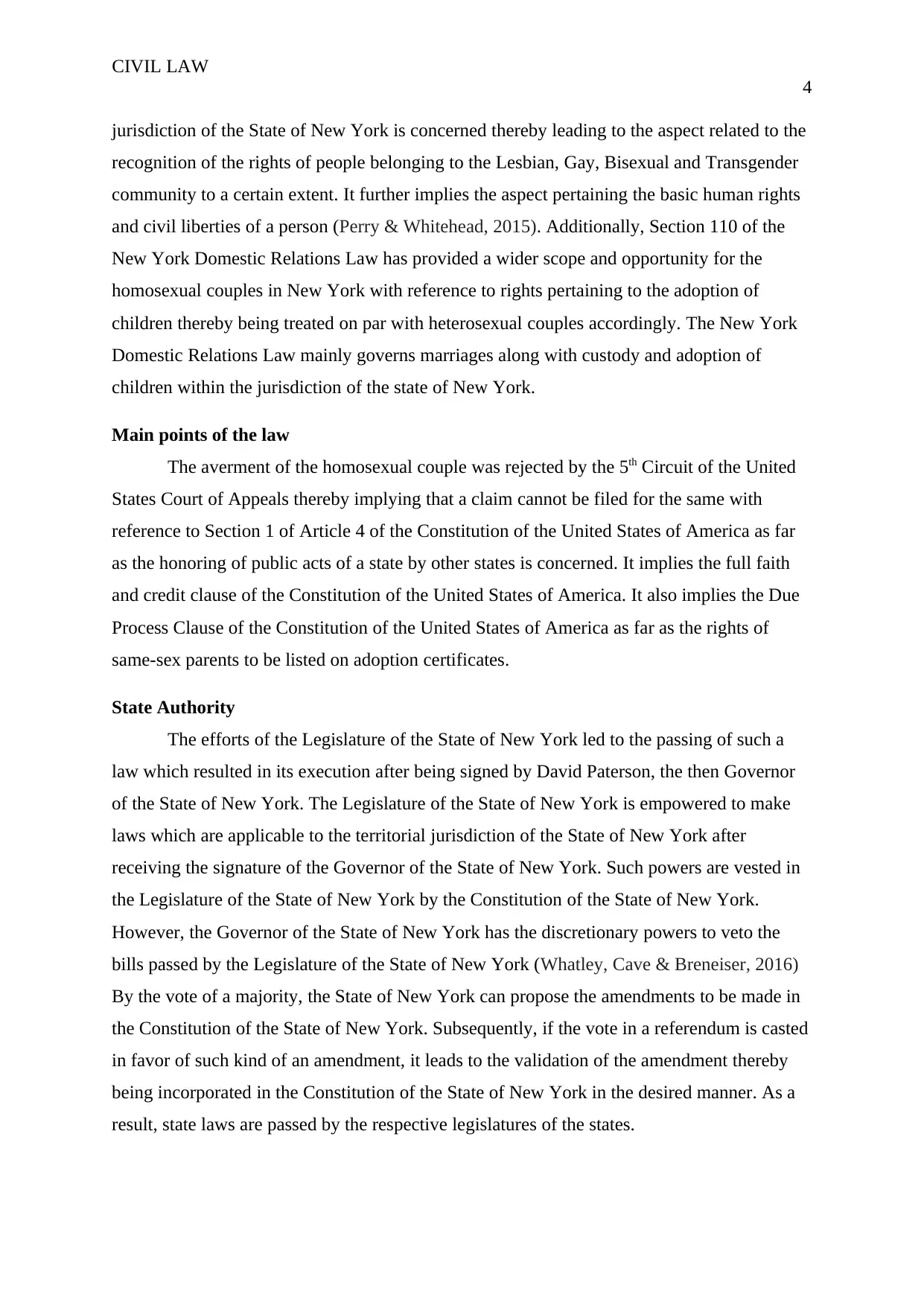
CIVIL LAW
4
jurisdiction of the State of New York is concerned thereby leading to the aspect related to the
recognition of the rights of people belonging to the Lesbian, Gay, Bisexual and Transgender
community to a certain extent. It further implies the aspect pertaining the basic human rights
and civil liberties of a person (Perry & Whitehead, 2015). Additionally, Section 110 of the
New York Domestic Relations Law has provided a wider scope and opportunity for the
homosexual couples in New York with reference to rights pertaining to the adoption of
children thereby being treated on par with heterosexual couples accordingly. The New York
Domestic Relations Law mainly governs marriages along with custody and adoption of
children within the jurisdiction of the state of New York.
Main points of the law
The averment of the homosexual couple was rejected by the 5th Circuit of the United
States Court of Appeals thereby implying that a claim cannot be filed for the same with
reference to Section 1 of Article 4 of the Constitution of the United States of America as far
as the honoring of public acts of a state by other states is concerned. It implies the full faith
and credit clause of the Constitution of the United States of America. It also implies the Due
Process Clause of the Constitution of the United States of America as far as the rights of
same-sex parents to be listed on adoption certificates.
State Authority
The efforts of the Legislature of the State of New York led to the passing of such a
law which resulted in its execution after being signed by David Paterson, the then Governor
of the State of New York. The Legislature of the State of New York is empowered to make
laws which are applicable to the territorial jurisdiction of the State of New York after
receiving the signature of the Governor of the State of New York. Such powers are vested in
the Legislature of the State of New York by the Constitution of the State of New York.
However, the Governor of the State of New York has the discretionary powers to veto the
bills passed by the Legislature of the State of New York (Whatley, Cave & Breneiser, 2016)
By the vote of a majority, the State of New York can propose the amendments to be made in
the Constitution of the State of New York. Subsequently, if the vote in a referendum is casted
in favor of such kind of an amendment, it leads to the validation of the amendment thereby
being incorporated in the Constitution of the State of New York in the desired manner. As a
result, state laws are passed by the respective legislatures of the states.
4
jurisdiction of the State of New York is concerned thereby leading to the aspect related to the
recognition of the rights of people belonging to the Lesbian, Gay, Bisexual and Transgender
community to a certain extent. It further implies the aspect pertaining the basic human rights
and civil liberties of a person (Perry & Whitehead, 2015). Additionally, Section 110 of the
New York Domestic Relations Law has provided a wider scope and opportunity for the
homosexual couples in New York with reference to rights pertaining to the adoption of
children thereby being treated on par with heterosexual couples accordingly. The New York
Domestic Relations Law mainly governs marriages along with custody and adoption of
children within the jurisdiction of the state of New York.
Main points of the law
The averment of the homosexual couple was rejected by the 5th Circuit of the United
States Court of Appeals thereby implying that a claim cannot be filed for the same with
reference to Section 1 of Article 4 of the Constitution of the United States of America as far
as the honoring of public acts of a state by other states is concerned. It implies the full faith
and credit clause of the Constitution of the United States of America. It also implies the Due
Process Clause of the Constitution of the United States of America as far as the rights of
same-sex parents to be listed on adoption certificates.
State Authority
The efforts of the Legislature of the State of New York led to the passing of such a
law which resulted in its execution after being signed by David Paterson, the then Governor
of the State of New York. The Legislature of the State of New York is empowered to make
laws which are applicable to the territorial jurisdiction of the State of New York after
receiving the signature of the Governor of the State of New York. Such powers are vested in
the Legislature of the State of New York by the Constitution of the State of New York.
However, the Governor of the State of New York has the discretionary powers to veto the
bills passed by the Legislature of the State of New York (Whatley, Cave & Breneiser, 2016)
By the vote of a majority, the State of New York can propose the amendments to be made in
the Constitution of the State of New York. Subsequently, if the vote in a referendum is casted
in favor of such kind of an amendment, it leads to the validation of the amendment thereby
being incorporated in the Constitution of the State of New York in the desired manner. As a
result, state laws are passed by the respective legislatures of the states.
Paraphrase This Document
Need a fresh take? Get an instant paraphrase of this document with our AI Paraphraser
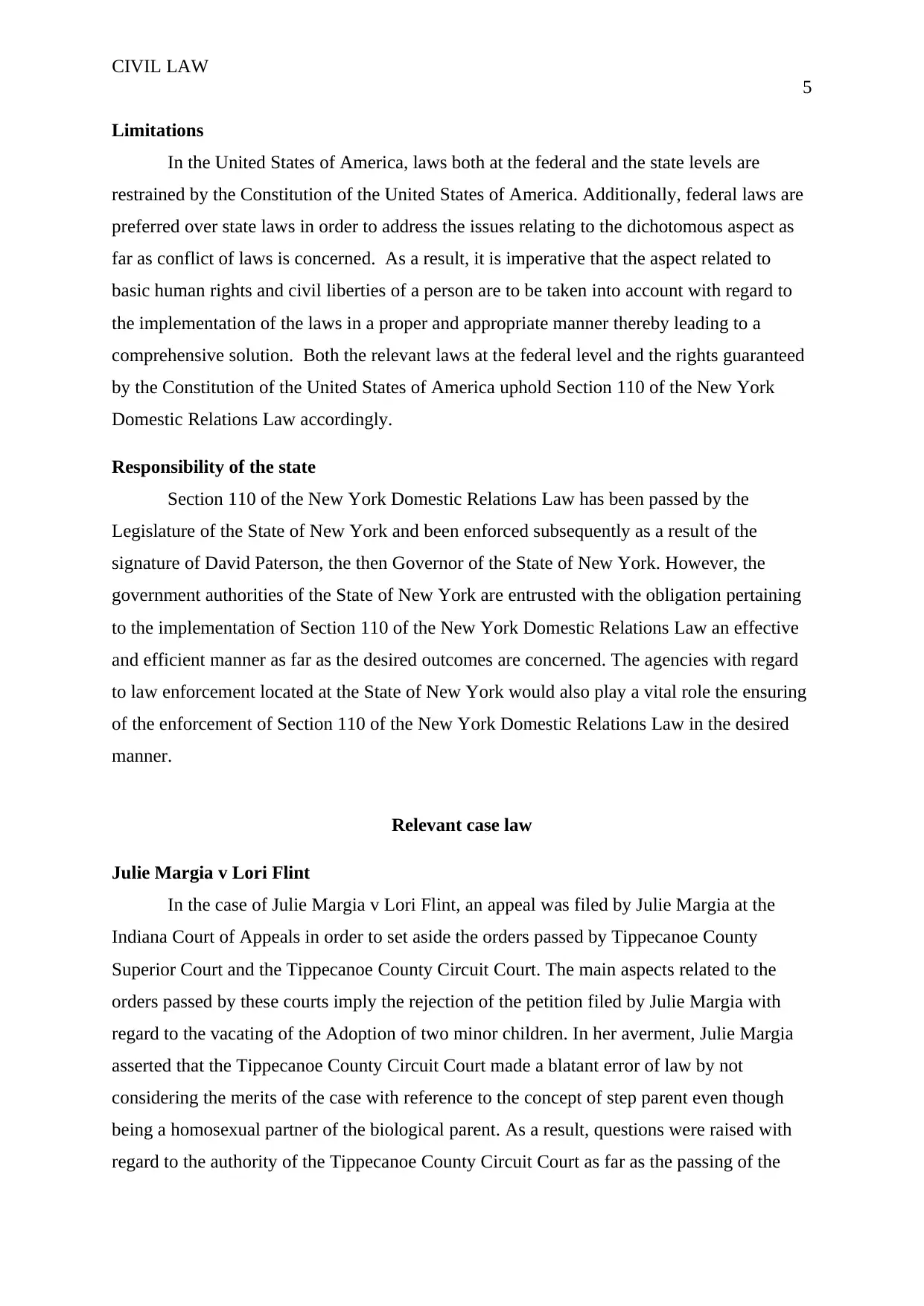
CIVIL LAW
5
Limitations
In the United States of America, laws both at the federal and the state levels are
restrained by the Constitution of the United States of America. Additionally, federal laws are
preferred over state laws in order to address the issues relating to the dichotomous aspect as
far as conflict of laws is concerned. As a result, it is imperative that the aspect related to
basic human rights and civil liberties of a person are to be taken into account with regard to
the implementation of the laws in a proper and appropriate manner thereby leading to a
comprehensive solution. Both the relevant laws at the federal level and the rights guaranteed
by the Constitution of the United States of America uphold Section 110 of the New York
Domestic Relations Law accordingly.
Responsibility of the state
Section 110 of the New York Domestic Relations Law has been passed by the
Legislature of the State of New York and been enforced subsequently as a result of the
signature of David Paterson, the then Governor of the State of New York. However, the
government authorities of the State of New York are entrusted with the obligation pertaining
to the implementation of Section 110 of the New York Domestic Relations Law an effective
and efficient manner as far as the desired outcomes are concerned. The agencies with regard
to law enforcement located at the State of New York would also play a vital role the ensuring
of the enforcement of Section 110 of the New York Domestic Relations Law in the desired
manner.
Relevant case law
Julie Margia v Lori Flint
In the case of Julie Margia v Lori Flint, an appeal was filed by Julie Margia at the
Indiana Court of Appeals in order to set aside the orders passed by Tippecanoe County
Superior Court and the Tippecanoe County Circuit Court. The main aspects related to the
orders passed by these courts imply the rejection of the petition filed by Julie Margia with
regard to the vacating of the Adoption of two minor children. In her averment, Julie Margia
asserted that the Tippecanoe County Circuit Court made a blatant error of law by not
considering the merits of the case with reference to the concept of step parent even though
being a homosexual partner of the biological parent. As a result, questions were raised with
regard to the authority of the Tippecanoe County Circuit Court as far as the passing of the
5
Limitations
In the United States of America, laws both at the federal and the state levels are
restrained by the Constitution of the United States of America. Additionally, federal laws are
preferred over state laws in order to address the issues relating to the dichotomous aspect as
far as conflict of laws is concerned. As a result, it is imperative that the aspect related to
basic human rights and civil liberties of a person are to be taken into account with regard to
the implementation of the laws in a proper and appropriate manner thereby leading to a
comprehensive solution. Both the relevant laws at the federal level and the rights guaranteed
by the Constitution of the United States of America uphold Section 110 of the New York
Domestic Relations Law accordingly.
Responsibility of the state
Section 110 of the New York Domestic Relations Law has been passed by the
Legislature of the State of New York and been enforced subsequently as a result of the
signature of David Paterson, the then Governor of the State of New York. However, the
government authorities of the State of New York are entrusted with the obligation pertaining
to the implementation of Section 110 of the New York Domestic Relations Law an effective
and efficient manner as far as the desired outcomes are concerned. The agencies with regard
to law enforcement located at the State of New York would also play a vital role the ensuring
of the enforcement of Section 110 of the New York Domestic Relations Law in the desired
manner.
Relevant case law
Julie Margia v Lori Flint
In the case of Julie Margia v Lori Flint, an appeal was filed by Julie Margia at the
Indiana Court of Appeals in order to set aside the orders passed by Tippecanoe County
Superior Court and the Tippecanoe County Circuit Court. The main aspects related to the
orders passed by these courts imply the rejection of the petition filed by Julie Margia with
regard to the vacating of the Adoption of two minor children. In her averment, Julie Margia
asserted that the Tippecanoe County Circuit Court made a blatant error of law by not
considering the merits of the case with reference to the concept of step parent even though
being a homosexual partner of the biological parent. As a result, questions were raised with
regard to the authority of the Tippecanoe County Circuit Court as far as the passing of the
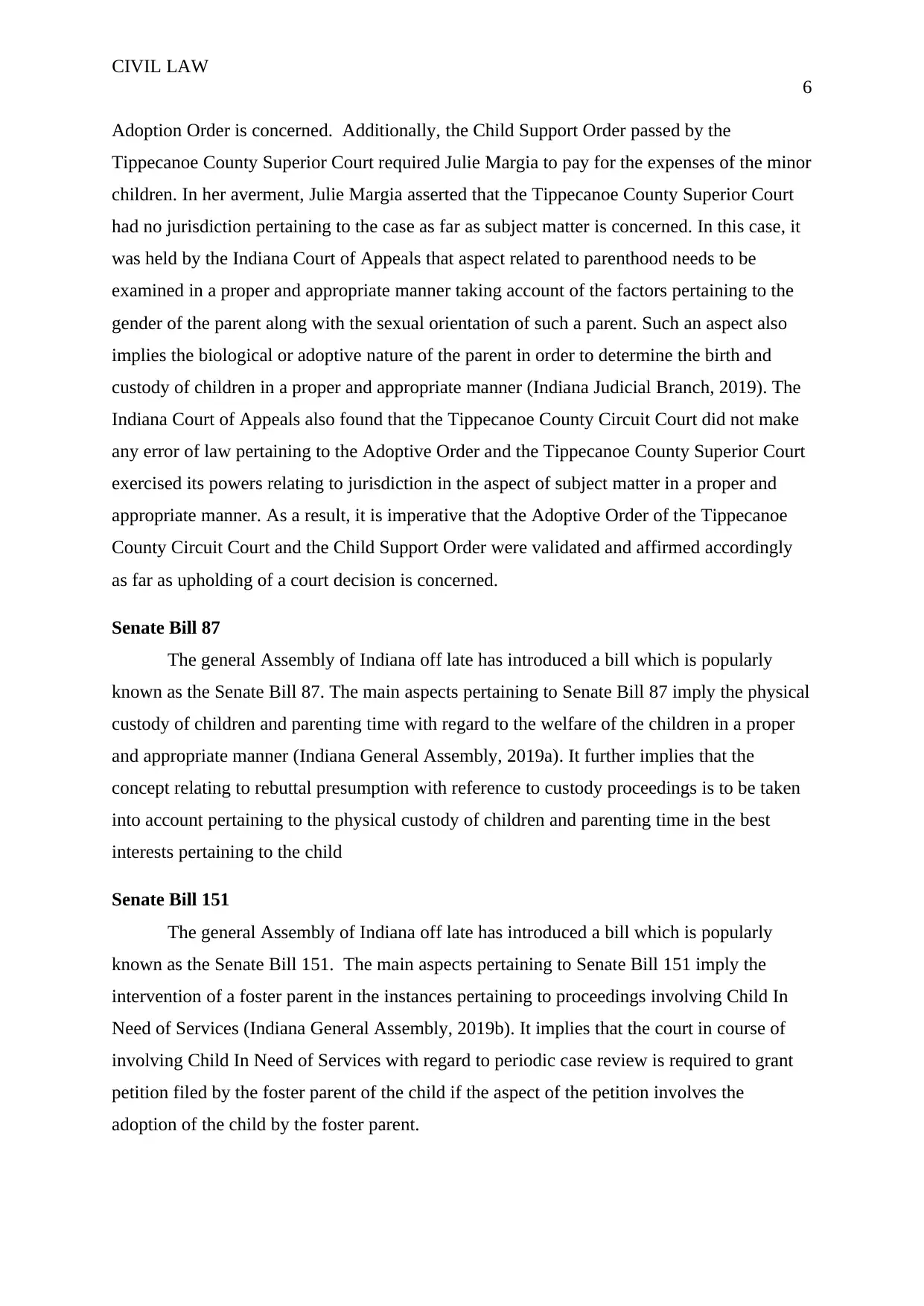
CIVIL LAW
6
Adoption Order is concerned. Additionally, the Child Support Order passed by the
Tippecanoe County Superior Court required Julie Margia to pay for the expenses of the minor
children. In her averment, Julie Margia asserted that the Tippecanoe County Superior Court
had no jurisdiction pertaining to the case as far as subject matter is concerned. In this case, it
was held by the Indiana Court of Appeals that aspect related to parenthood needs to be
examined in a proper and appropriate manner taking account of the factors pertaining to the
gender of the parent along with the sexual orientation of such a parent. Such an aspect also
implies the biological or adoptive nature of the parent in order to determine the birth and
custody of children in a proper and appropriate manner (Indiana Judicial Branch, 2019). The
Indiana Court of Appeals also found that the Tippecanoe County Circuit Court did not make
any error of law pertaining to the Adoptive Order and the Tippecanoe County Superior Court
exercised its powers relating to jurisdiction in the aspect of subject matter in a proper and
appropriate manner. As a result, it is imperative that the Adoptive Order of the Tippecanoe
County Circuit Court and the Child Support Order were validated and affirmed accordingly
as far as upholding of a court decision is concerned.
Senate Bill 87
The general Assembly of Indiana off late has introduced a bill which is popularly
known as the Senate Bill 87. The main aspects pertaining to Senate Bill 87 imply the physical
custody of children and parenting time with regard to the welfare of the children in a proper
and appropriate manner (Indiana General Assembly, 2019a). It further implies that the
concept relating to rebuttal presumption with reference to custody proceedings is to be taken
into account pertaining to the physical custody of children and parenting time in the best
interests pertaining to the child
Senate Bill 151
The general Assembly of Indiana off late has introduced a bill which is popularly
known as the Senate Bill 151. The main aspects pertaining to Senate Bill 151 imply the
intervention of a foster parent in the instances pertaining to proceedings involving Child In
Need of Services (Indiana General Assembly, 2019b). It implies that the court in course of
involving Child In Need of Services with regard to periodic case review is required to grant
petition filed by the foster parent of the child if the aspect of the petition involves the
adoption of the child by the foster parent.
6
Adoption Order is concerned. Additionally, the Child Support Order passed by the
Tippecanoe County Superior Court required Julie Margia to pay for the expenses of the minor
children. In her averment, Julie Margia asserted that the Tippecanoe County Superior Court
had no jurisdiction pertaining to the case as far as subject matter is concerned. In this case, it
was held by the Indiana Court of Appeals that aspect related to parenthood needs to be
examined in a proper and appropriate manner taking account of the factors pertaining to the
gender of the parent along with the sexual orientation of such a parent. Such an aspect also
implies the biological or adoptive nature of the parent in order to determine the birth and
custody of children in a proper and appropriate manner (Indiana Judicial Branch, 2019). The
Indiana Court of Appeals also found that the Tippecanoe County Circuit Court did not make
any error of law pertaining to the Adoptive Order and the Tippecanoe County Superior Court
exercised its powers relating to jurisdiction in the aspect of subject matter in a proper and
appropriate manner. As a result, it is imperative that the Adoptive Order of the Tippecanoe
County Circuit Court and the Child Support Order were validated and affirmed accordingly
as far as upholding of a court decision is concerned.
Senate Bill 87
The general Assembly of Indiana off late has introduced a bill which is popularly
known as the Senate Bill 87. The main aspects pertaining to Senate Bill 87 imply the physical
custody of children and parenting time with regard to the welfare of the children in a proper
and appropriate manner (Indiana General Assembly, 2019a). It further implies that the
concept relating to rebuttal presumption with reference to custody proceedings is to be taken
into account pertaining to the physical custody of children and parenting time in the best
interests pertaining to the child
Senate Bill 151
The general Assembly of Indiana off late has introduced a bill which is popularly
known as the Senate Bill 151. The main aspects pertaining to Senate Bill 151 imply the
intervention of a foster parent in the instances pertaining to proceedings involving Child In
Need of Services (Indiana General Assembly, 2019b). It implies that the court in course of
involving Child In Need of Services with regard to periodic case review is required to grant
petition filed by the foster parent of the child if the aspect of the petition involves the
adoption of the child by the foster parent.
⊘ This is a preview!⊘
Do you want full access?
Subscribe today to unlock all pages.

Trusted by 1+ million students worldwide
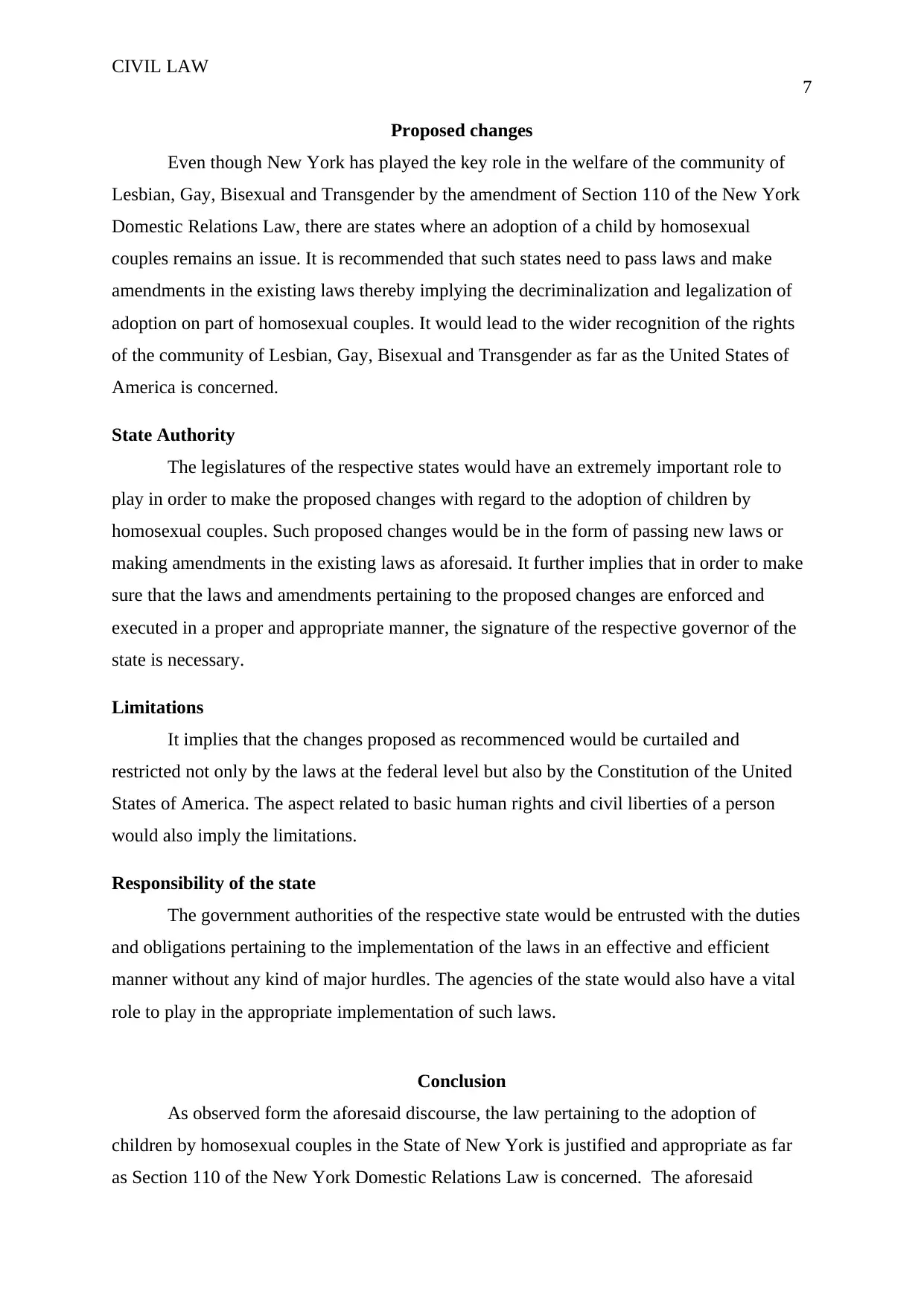
CIVIL LAW
7
Proposed changes
Even though New York has played the key role in the welfare of the community of
Lesbian, Gay, Bisexual and Transgender by the amendment of Section 110 of the New York
Domestic Relations Law, there are states where an adoption of a child by homosexual
couples remains an issue. It is recommended that such states need to pass laws and make
amendments in the existing laws thereby implying the decriminalization and legalization of
adoption on part of homosexual couples. It would lead to the wider recognition of the rights
of the community of Lesbian, Gay, Bisexual and Transgender as far as the United States of
America is concerned.
State Authority
The legislatures of the respective states would have an extremely important role to
play in order to make the proposed changes with regard to the adoption of children by
homosexual couples. Such proposed changes would be in the form of passing new laws or
making amendments in the existing laws as aforesaid. It further implies that in order to make
sure that the laws and amendments pertaining to the proposed changes are enforced and
executed in a proper and appropriate manner, the signature of the respective governor of the
state is necessary.
Limitations
It implies that the changes proposed as recommenced would be curtailed and
restricted not only by the laws at the federal level but also by the Constitution of the United
States of America. The aspect related to basic human rights and civil liberties of a person
would also imply the limitations.
Responsibility of the state
The government authorities of the respective state would be entrusted with the duties
and obligations pertaining to the implementation of the laws in an effective and efficient
manner without any kind of major hurdles. The agencies of the state would also have a vital
role to play in the appropriate implementation of such laws.
Conclusion
As observed form the aforesaid discourse, the law pertaining to the adoption of
children by homosexual couples in the State of New York is justified and appropriate as far
as Section 110 of the New York Domestic Relations Law is concerned. The aforesaid
7
Proposed changes
Even though New York has played the key role in the welfare of the community of
Lesbian, Gay, Bisexual and Transgender by the amendment of Section 110 of the New York
Domestic Relations Law, there are states where an adoption of a child by homosexual
couples remains an issue. It is recommended that such states need to pass laws and make
amendments in the existing laws thereby implying the decriminalization and legalization of
adoption on part of homosexual couples. It would lead to the wider recognition of the rights
of the community of Lesbian, Gay, Bisexual and Transgender as far as the United States of
America is concerned.
State Authority
The legislatures of the respective states would have an extremely important role to
play in order to make the proposed changes with regard to the adoption of children by
homosexual couples. Such proposed changes would be in the form of passing new laws or
making amendments in the existing laws as aforesaid. It further implies that in order to make
sure that the laws and amendments pertaining to the proposed changes are enforced and
executed in a proper and appropriate manner, the signature of the respective governor of the
state is necessary.
Limitations
It implies that the changes proposed as recommenced would be curtailed and
restricted not only by the laws at the federal level but also by the Constitution of the United
States of America. The aspect related to basic human rights and civil liberties of a person
would also imply the limitations.
Responsibility of the state
The government authorities of the respective state would be entrusted with the duties
and obligations pertaining to the implementation of the laws in an effective and efficient
manner without any kind of major hurdles. The agencies of the state would also have a vital
role to play in the appropriate implementation of such laws.
Conclusion
As observed form the aforesaid discourse, the law pertaining to the adoption of
children by homosexual couples in the State of New York is justified and appropriate as far
as Section 110 of the New York Domestic Relations Law is concerned. The aforesaid
Paraphrase This Document
Need a fresh take? Get an instant paraphrase of this document with our AI Paraphraser
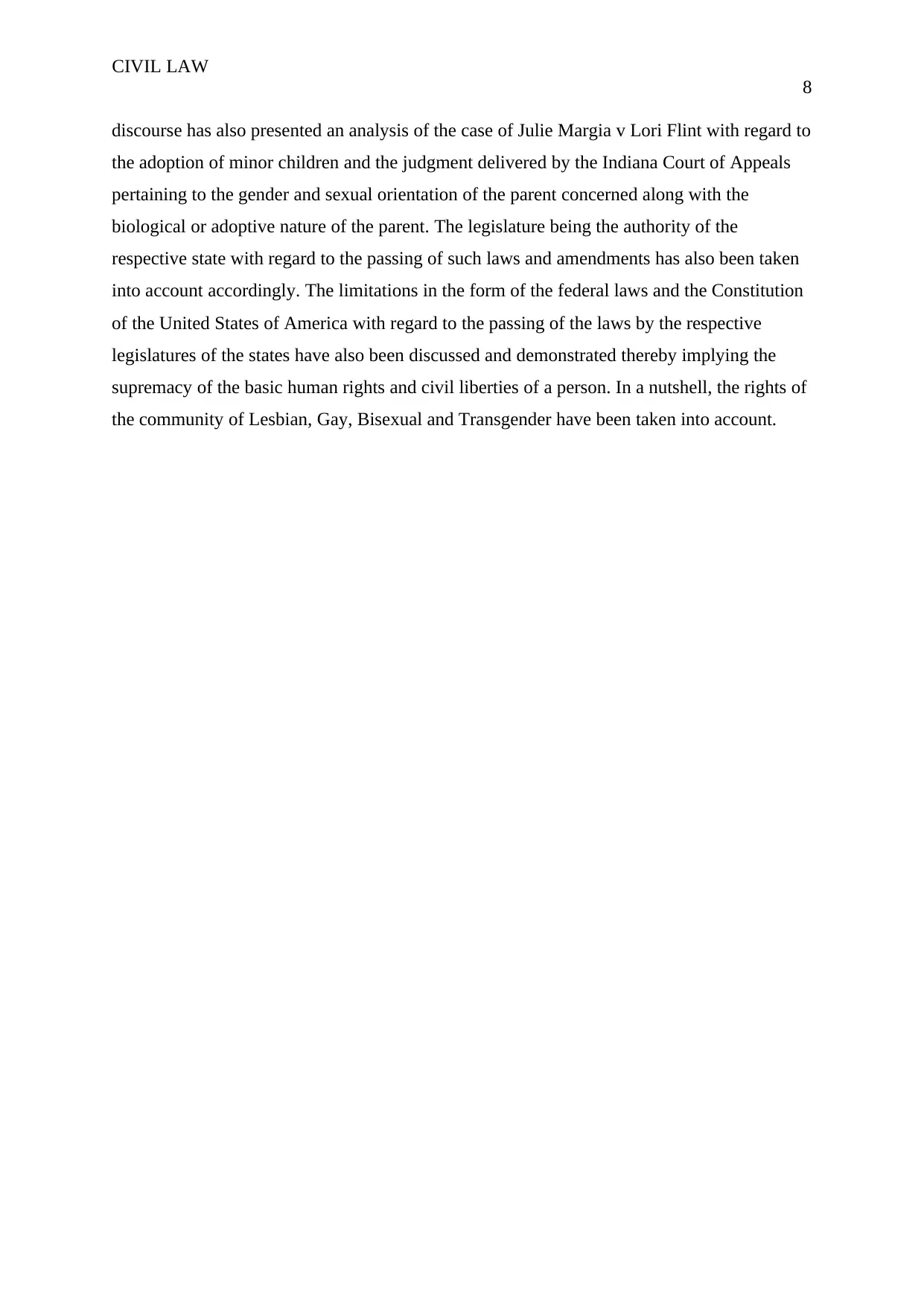
CIVIL LAW
8
discourse has also presented an analysis of the case of Julie Margia v Lori Flint with regard to
the adoption of minor children and the judgment delivered by the Indiana Court of Appeals
pertaining to the gender and sexual orientation of the parent concerned along with the
biological or adoptive nature of the parent. The legislature being the authority of the
respective state with regard to the passing of such laws and amendments has also been taken
into account accordingly. The limitations in the form of the federal laws and the Constitution
of the United States of America with regard to the passing of the laws by the respective
legislatures of the states have also been discussed and demonstrated thereby implying the
supremacy of the basic human rights and civil liberties of a person. In a nutshell, the rights of
the community of Lesbian, Gay, Bisexual and Transgender have been taken into account.
8
discourse has also presented an analysis of the case of Julie Margia v Lori Flint with regard to
the adoption of minor children and the judgment delivered by the Indiana Court of Appeals
pertaining to the gender and sexual orientation of the parent concerned along with the
biological or adoptive nature of the parent. The legislature being the authority of the
respective state with regard to the passing of such laws and amendments has also been taken
into account accordingly. The limitations in the form of the federal laws and the Constitution
of the United States of America with regard to the passing of the laws by the respective
legislatures of the states have also been discussed and demonstrated thereby implying the
supremacy of the basic human rights and civil liberties of a person. In a nutshell, the rights of
the community of Lesbian, Gay, Bisexual and Transgender have been taken into account.
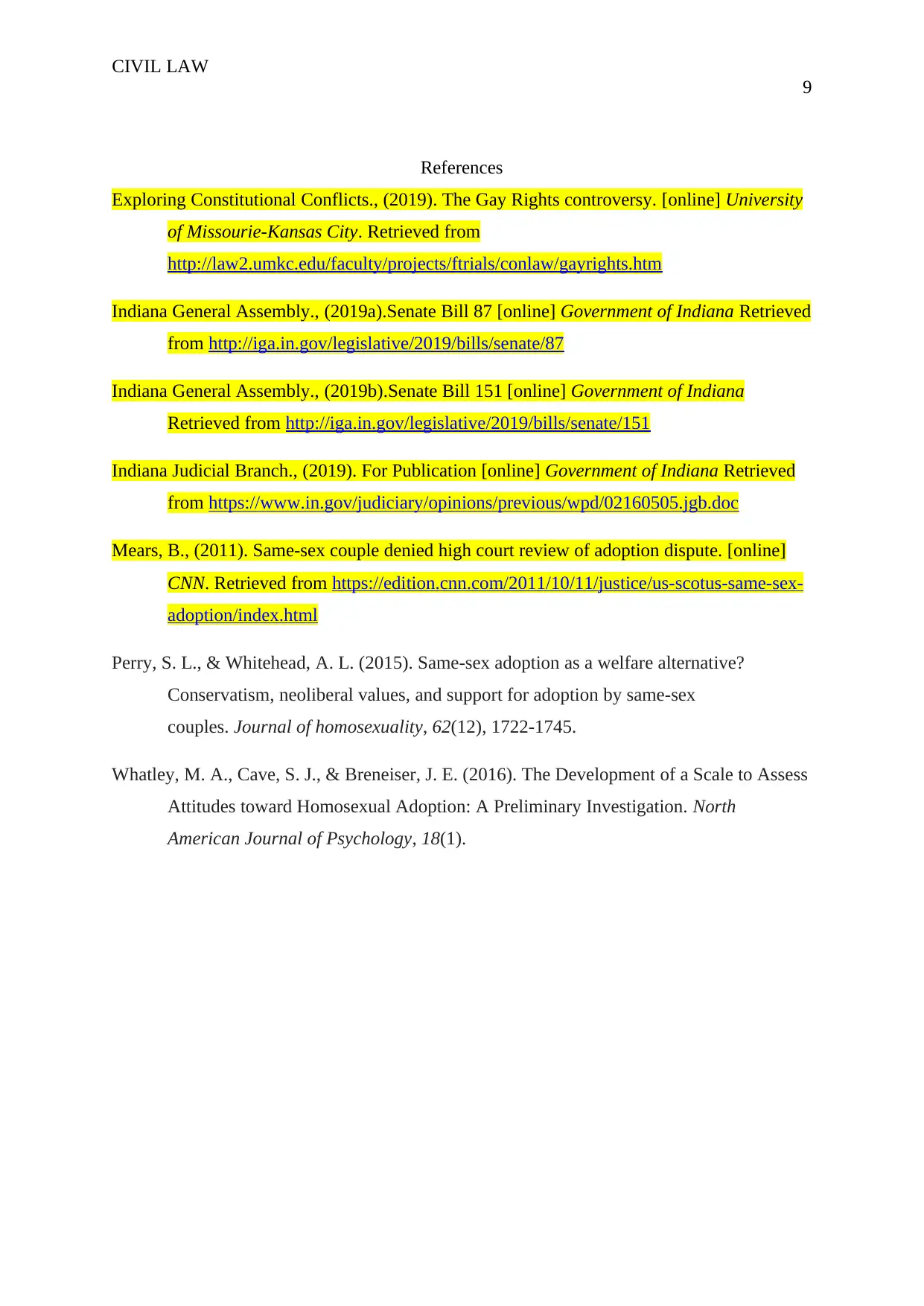
CIVIL LAW
9
References
Exploring Constitutional Conflicts., (2019). The Gay Rights controversy. [online] University
of Missourie-Kansas City. Retrieved from
http://law2.umkc.edu/faculty/projects/ftrials/conlaw/gayrights.htm
Indiana General Assembly., (2019a).Senate Bill 87 [online] Government of Indiana Retrieved
from http://iga.in.gov/legislative/2019/bills/senate/87
Indiana General Assembly., (2019b).Senate Bill 151 [online] Government of Indiana
Retrieved from http://iga.in.gov/legislative/2019/bills/senate/151
Indiana Judicial Branch., (2019). For Publication [online] Government of Indiana Retrieved
from https://www.in.gov/judiciary/opinions/previous/wpd/02160505.jgb.doc
Mears, B., (2011). Same-sex couple denied high court review of adoption dispute. [online]
CNN. Retrieved from https://edition.cnn.com/2011/10/11/justice/us-scotus-same-sex-
adoption/index.html
Perry, S. L., & Whitehead, A. L. (2015). Same-sex adoption as a welfare alternative?
Conservatism, neoliberal values, and support for adoption by same-sex
couples. Journal of homosexuality, 62(12), 1722-1745.
Whatley, M. A., Cave, S. J., & Breneiser, J. E. (2016). The Development of a Scale to Assess
Attitudes toward Homosexual Adoption: A Preliminary Investigation. North
American Journal of Psychology, 18(1).
9
References
Exploring Constitutional Conflicts., (2019). The Gay Rights controversy. [online] University
of Missourie-Kansas City. Retrieved from
http://law2.umkc.edu/faculty/projects/ftrials/conlaw/gayrights.htm
Indiana General Assembly., (2019a).Senate Bill 87 [online] Government of Indiana Retrieved
from http://iga.in.gov/legislative/2019/bills/senate/87
Indiana General Assembly., (2019b).Senate Bill 151 [online] Government of Indiana
Retrieved from http://iga.in.gov/legislative/2019/bills/senate/151
Indiana Judicial Branch., (2019). For Publication [online] Government of Indiana Retrieved
from https://www.in.gov/judiciary/opinions/previous/wpd/02160505.jgb.doc
Mears, B., (2011). Same-sex couple denied high court review of adoption dispute. [online]
CNN. Retrieved from https://edition.cnn.com/2011/10/11/justice/us-scotus-same-sex-
adoption/index.html
Perry, S. L., & Whitehead, A. L. (2015). Same-sex adoption as a welfare alternative?
Conservatism, neoliberal values, and support for adoption by same-sex
couples. Journal of homosexuality, 62(12), 1722-1745.
Whatley, M. A., Cave, S. J., & Breneiser, J. E. (2016). The Development of a Scale to Assess
Attitudes toward Homosexual Adoption: A Preliminary Investigation. North
American Journal of Psychology, 18(1).
⊘ This is a preview!⊘
Do you want full access?
Subscribe today to unlock all pages.

Trusted by 1+ million students worldwide
1 out of 9
Related Documents
Your All-in-One AI-Powered Toolkit for Academic Success.
+13062052269
info@desklib.com
Available 24*7 on WhatsApp / Email
![[object Object]](/_next/static/media/star-bottom.7253800d.svg)
Unlock your academic potential
Copyright © 2020–2026 A2Z Services. All Rights Reserved. Developed and managed by ZUCOL.




